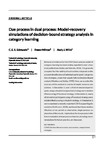Due process in dual process: Model-recovery simulations of decision-bound strategy analysis in category learning
| dc.contributor.author | Edmunds, C | |
| dc.contributor.author | Milton, F | |
| dc.contributor.author | Wills, Andy | |
| dc.date.accessioned | 2018-03-05T17:31:48Z | |
| dc.date.available | 2018-03-05T17:31:48Z | |
| dc.date.issued | 2018-06 | |
| dc.identifier.issn | 0364-0213 | |
| dc.identifier.issn | 1551-6709 | |
| dc.identifier.uri | http://hdl.handle.net/10026.1/10962 | |
| dc.description.abstract |
<jats:title>Abstract</jats:title><jats:p>Behavioral evidence for the <jats:styled-content style="fixed-case">COVIS</jats:styled-content> dual‐process model of category learning has been widely reported in over a hundred publications (Ashby & Valentin, <jats:ext-link xmlns:xlink="http://www.w3.org/1999/xlink" xlink:href="#cogs12607-bib-0011" />). It is generally accepted that the validity of such evidence depends on the accurate identification of individual participants' categorization strategies, a task that usually falls to Decision Bound analysis (Maddox & Ashby, <jats:ext-link xmlns:xlink="http://www.w3.org/1999/xlink" xlink:href="#cogs12607-bib-0037" />). Here, we examine the accuracy of this analysis in a series of model‐recovery simulations. In Simulation 1, over a third of simulated participants using an Explicit (conjunctive) strategy were misidentified as using a Procedural strategy. In Simulation 2, nearly all simulated participants using a Procedural strategy were misidentified as using an Explicit strategy. In Simulation 3, we re‐examined a recently reported <jats:styled-content style="fixed-case">COVIS</jats:styled-content>‐supporting dissociation (Smith et al., <jats:ext-link xmlns:xlink="http://www.w3.org/1999/xlink" xlink:href="#cogs12607-bib-0058" />) and found that these misidentification errors permit an alternative, single‐process, explanation of the results. Implications for due process in the future evaluation of dual‐process theories, including recommendations for future practice, are discussed.</jats:p> | |
| dc.format.extent | 833-860 | |
| dc.format.medium | Print-Electronic | |
| dc.language | en | |
| dc.language.iso | en | |
| dc.publisher | Wiley | |
| dc.subject | COVIS | |
| dc.subject | Decision-bound analysis | |
| dc.subject | Dual systems | |
| dc.subject | Categorization strategies | |
| dc.title | Due process in dual process: Model-recovery simulations of decision-bound strategy analysis in category learning | |
| dc.type | journal-article | |
| dc.type | Journal Article | |
| plymouth.author-url | https://www.webofscience.com/api/gateway?GWVersion=2&SrcApp=PARTNER_APP&SrcAuth=LinksAMR&KeyUT=WOS:000434272400007&DestLinkType=FullRecord&DestApp=ALL_WOS&UsrCustomerID=11bb513d99f797142bcfeffcc58ea008 | |
| plymouth.issue | S3 | |
| plymouth.volume | 42 | |
| plymouth.publication-status | Published | |
| plymouth.journal | Cognitive Science | |
| dc.identifier.doi | 10.1111/cogs.12607 | |
| plymouth.organisational-group | /Plymouth | |
| plymouth.organisational-group | /Plymouth/Admin Group - REF | |
| plymouth.organisational-group | /Plymouth/Admin Group - REF/REF Admin Group - FoH | |
| plymouth.organisational-group | /Plymouth/Faculty of Health | |
| plymouth.organisational-group | /Plymouth/Faculty of Health/School of Psychology | |
| plymouth.organisational-group | /Plymouth/REF 2021 Researchers by UoA | |
| plymouth.organisational-group | /Plymouth/REF 2021 Researchers by UoA/UoA04 Psychology, Psychiatry and Neuroscience | |
| plymouth.organisational-group | /Plymouth/Research Groups | |
| plymouth.organisational-group | /Plymouth/Research Groups/Institute of Health and Community | |
| plymouth.organisational-group | /Plymouth/Users by role | |
| plymouth.organisational-group | /Plymouth/Users by role/Academics | |
| dc.publisher.place | United States | |
| dcterms.dateAccepted | 2018-02-15 | |
| dc.rights.embargodate | 2019-3-23 | |
| dc.identifier.eissn | 1551-6709 | |
| dc.rights.embargoperiod | Not known | |
| rioxxterms.version | Accepted Manuscript | |
| rioxxterms.versionofrecord | 10.1111/cogs.12607 | |
| rioxxterms.licenseref.uri | http://www.rioxx.net/licenses/all-rights-reserved | |
| rioxxterms.licenseref.startdate | 2018-06 | |
| rioxxterms.type | Journal Article/Review |


